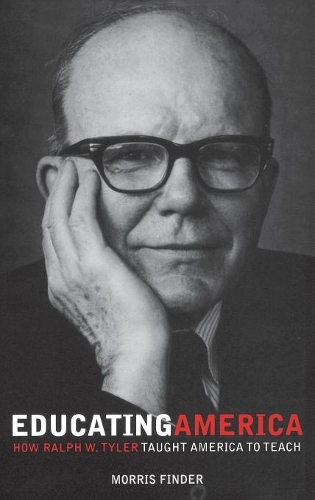
Educating America: How Ralph W. Tyler Taught America to Teach
(Hardback)
Publishing Details
Educating America: How Ralph W. Tyler Taught America to Teach
By (Author) Morris Finder
Bloomsbury Publishing PLC
Praeger Publishers Inc
30th August 2004
United States
Classifications
General
Non Fiction
370.92
Physical Properties
Hardback
256
Width 156mm, Height 235mm
539g
Description
In his preface to this work, Henry Louis Gates Jr. writes, "If you want insight into what's right and what's wrong about the current debate over standards, you'd be well advised to start with the redoubtable Ralph Tyler." Finder's work is the first to chart the career of the man who developed the nation's report card, the National Assessment of Educational Progress. Ralph W. Tyler, one of the most influential educators of the 20th century, held strong and closely argued views on issues we debate today tracking, class size, and how the school can cope with the demands of the public. In his decades long career at some of the nation's most prestigious universities, Ralph W. Tyler changed the course of American education. His work reverberates today in our national discourse on public schooling and in the currency of his groundbreaking testing instrument, the National Assessment of Educational Progress. It was Tyler who, during the Great Depression, understood that high schools in particular must prepare their graduates for practical and useful work. Tyler maintained his connection with teachers and public schools by managing to spend several hours a week visiting various classrooms and engaging instructors and administrators. Tyler, a strong proponent of local control of schools, was convinced that nationwide tests and standards were unsuited to the diversity of communities across the country. His own assessment, the NAEP was developed in such a way as to be informative but not necessarily prescriptive. Tyler's commitment to teacher education resulted in the establishment of workshops, a radical idea in its time. The author, a student of Tyler's while teaching school in Chicago, brings the insider's perspective to Tyler's work. In so doing, he presents an informed view of an educator whose strong views and philosophy affect schools in the United States to this day.
Reviews
"[C]aptures the essence of a man whose accomplishments far exceeded both the recognition he received and his own perception of them. Tyler would have enjoyed it. Indeed, he might well have bequeathed it as a legacy to us all from which we could go on learning from him. Tyler once said that, before retiring each night, he asked himself what he had learned that day and how he might use it. Each of us might read a little of Finder's slim volume each evening and contemplate what we learned and how we might use it to better our lives and those of others. Finder has given us the memorial that most appropriately reflects that quintessential teacher, Ralph Tyler, and the opportunity to learn from him again as though he were still our living mentor."-John Goodland Professor and Director, Center for Educational Renewal University of Washington, Seatle
"As America struggles with the social and political challenges of improving - or abandoning - public education, with the controversial effects of new testing policies on children's learning and schooling opportunities, and with the moral mandate(far from reality) of 'Leaving no child behind, ' Ralph Tyler still offers wisdom we sorely need. Everyone involved in the reform of public education today should read - and reread - this book."-Linda Darling-Hammond Charles E. Ducommun Professor of Education, Stanford University
"Ralph Tyler was an extraordinary man and Morris Finder's biography tells us why in a very engaging account."-Ellen Condliffe Lagemann Dean, Graduate School of Education Harvard University of Education
Author Bio
Morris Finder is professor emeritus of English education, School of Education at the State University of New York, Albany. He is the author of many professional articles and books. He received his PhD in education from the University of Chicago, where he met Ralph W. Tyler. He has taught in universities in the United States and abroad.
